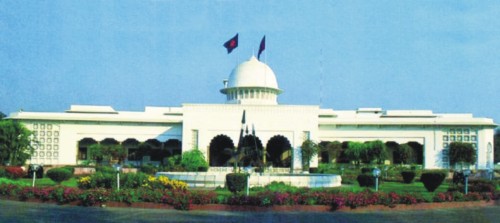Law opinion
Ordinance
making power of President: Some points to discuss
Abu
Sadat Md. Sayem Ali Pathan
It
is said that the Ordinance making power of the President
is not justifiable. But these comments may become the
subject of a discussion. In we go through the following
discussion, we may get a different thing.
It
is said in art.=1 of the Constitution of the Bangladesh,
while giving immunity to the President of Bangladesh,
that, "........but this clause shall not prejudice
the right of any person to take proceedings against the
Government." And according to art.102 (2)(a)(ii),
the High Court Division may make an order declaring that
the proceeding taken by a person performing functions
which has been done or taken without lawful authority
in connection with the affairs of the Republic or of a
local authority, has no legal effect.
Here,
`without lawful authority` should include the meaning
that an act has been done without maintaining the authority
of Constitution.
In
the case of Dr. Mohiuddin Faruque v. Bangladesh, [49 DLR
(AD) 1.], B. B. Roy, J. said in paragraph 97 that- "
...... the expression 'aggrieved person' means not only
any person who is personally aggrieved but also one whose
heart bleed for his less fortunate fellow beings nor a
wrong done by the Government or a local au|hority is not
fulfilling its constitutional or statutory obligation{."
Article
48(2) provides that, "the President shall, as Head
of State......" and according to article 152, 'State'
includes the Government. So, we may say tha| the President
is the head of the Government.
Article
93(1) provides that, the Pzesident can make and promulgate
Ordinance when he is satisfied that the existing circumstances
deserve immediate action. It is obviously a constitutional
obligation. And when he makes and promulgates an Ordinance
in such a situation that immediate action is not necessary
then it becomes a constitutional wrong.
In
the case of Anwar Hossain v. Bangladesh (1989), B.H. Chowdhury
said, ".....Then who will consider the validity or
otherwise the law? obviously the judiciary." According
to art.152, law also means Ordinance.
Thus,
we may say that if the President makes and promulgates
an Ordinance, the Ordinance may become justifiable on
the application of any aggrieved person in the High Court
Division on the ground that art.93 is not followed by
the President in regard to make and promulgate an Ordinance.
Ordinance
making power of President and a gap in the theory
It is said that, Constitution is the solemn expression
of the will of the people. Thus, all the power conferred
by the Constitution is conferred according to the will
of the people. So, the Ordinance making power of President
is a power, which is conferred according to the will of
the people. The Ordinance must be passed by the parliamentarians
[art.93].
However,
parliamen|arians are the zepresentatives of the people
and the wish of the people is expressed through the parliamentarians.
Thus, when the parliamentarians disapprove an Ordinance
it is to be seemed that the people also disapprove the
Ordinance. So, when the representatives of the people
disapprove an Ordinance then how does the Ordinance making
power of Presilent become the expression of the will of
the people?
So,
there is a gap. But it should be pointed out that, 1)
the Ordinance making power is conferred by the Constitution
according to the will of the people upon the President
in order to make and promulgate such a type of Ordinances
which reflect the will of the people according to the
provisions of the Constitution.

Photo:
Banglapedia
2)
President in order to make and promulgate the Ordinances
must deserves the consent of the cabinet. Thus, when an
Ordinance is made and promulgated, it is seemed that the
Ordinance has got the consent of the cabinet as well as
the con{ent of the people as the ministers are the representatives
of the people.
3)
it is seemed that the President as the head of the State
should be a man of conscience, good qualities, educated
and these things must be reflected through the acts of
the President. When the President makes and promulgates
any Ordinance, it is seemed that it will be such a nature
which will able to be passed by the parliamentarians.
4)
When any power or duty is conferred then it is thought
that it will be done honestly.
So,
there is no gap at all. The nature and result of power
and duty is depended upon the way of application of the
power and perform of duty. The Ordinance making power
of President is conferred by the Constitution so that
it will be practiced honestly. But does it hamper the
concept of popular sovereignty:
It
is said that by using the Ordinance making power, the
President moves aside the Parliament. The parliamentarians
are the representatives of the people and through them
the will of the people is expressed. So, when an Ordinance
is made and promulgated it moves aside the will of the
people. Thus, it is said that the Ordinance making power
of President hampers the concept of popular sovereignty.
But
it can be said that the power does not hamper the concept
totally, because of the reasons mentioned above.
Art.48
(2) says that, "The President shall, as the Head
of State..." that is the president is the head of
the State.
Art.152
says, "State includes the Parliament, the Government
and statutory public authorities."
Thus,
is the President the head of the Parliament, the Government
and statutory public authorities?
The
author is studying LLB (Hons.)at Dhaka University.